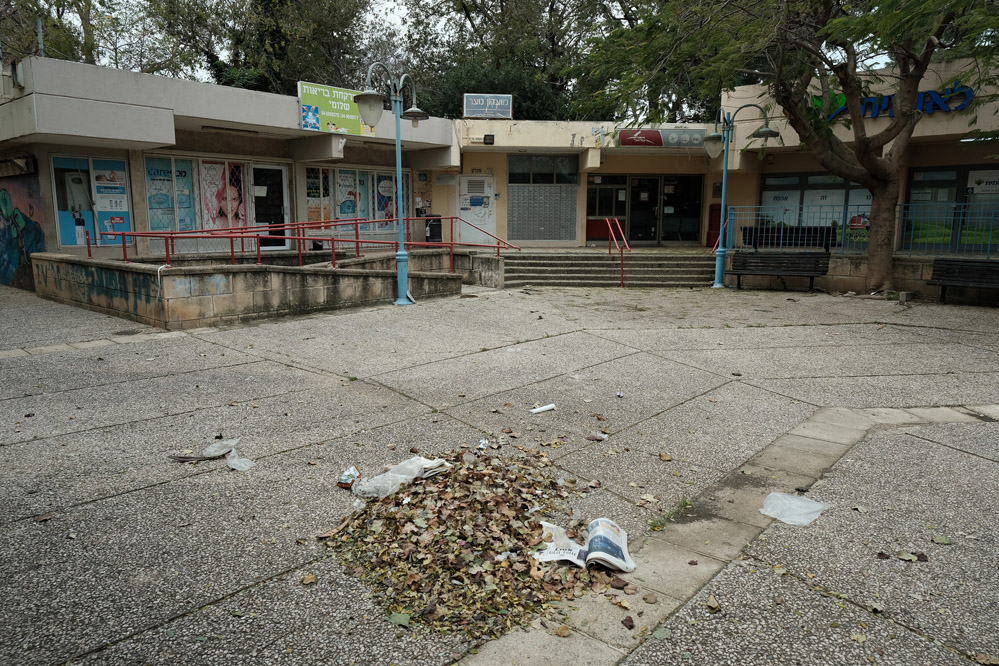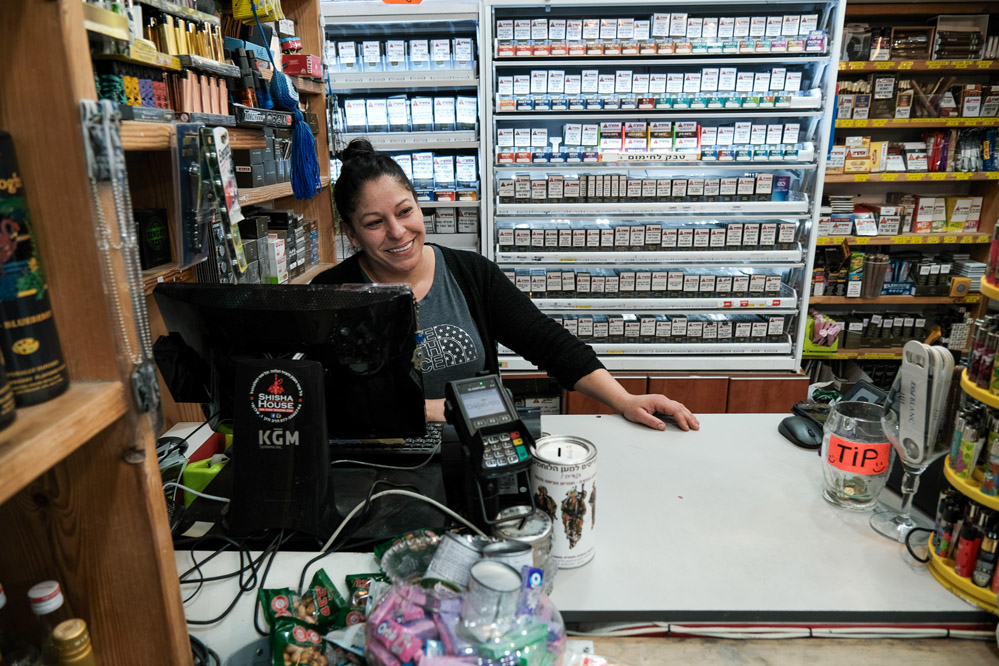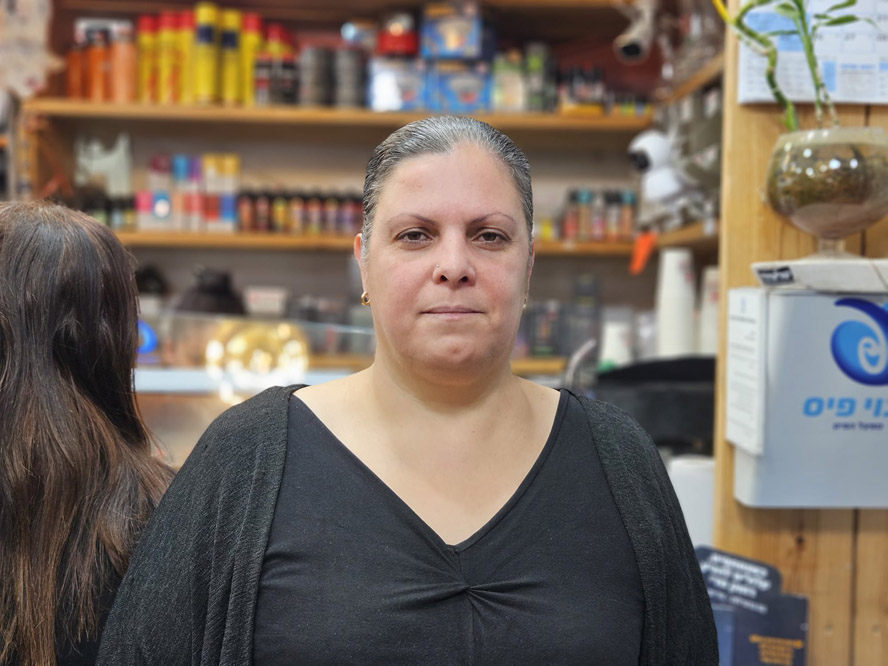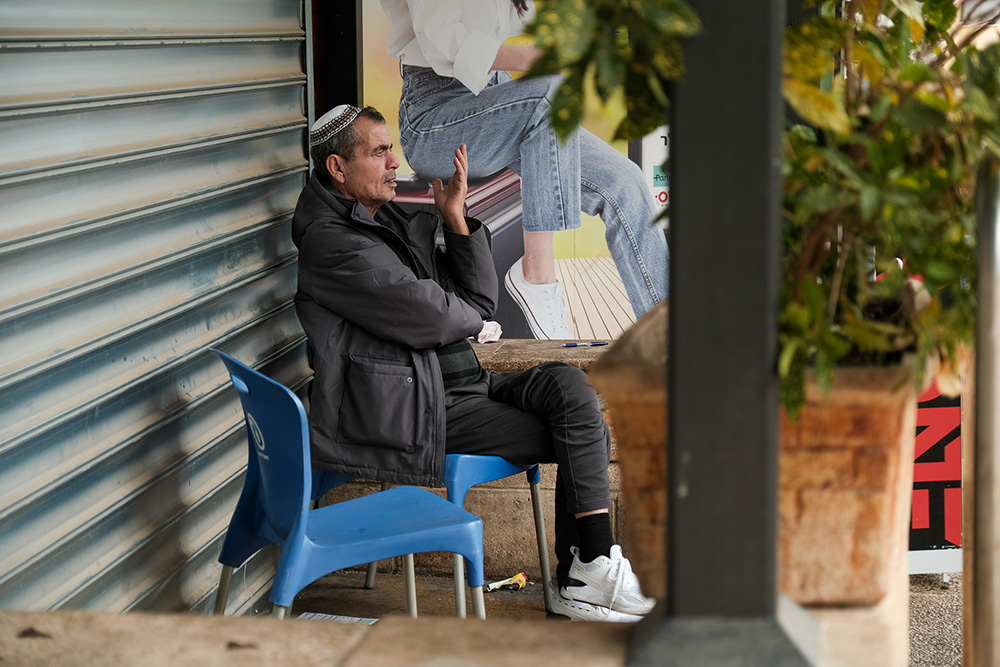
At the entrance to the northern town of Shlomi sits a military checkpoint with a sign warning that the area is exposed to Lebanese missiles. The town is deserted. Its 8,000 residents were evacuated in light of the frequent barrages which have been fired over the border recently.
“We’re Not Afraid of the Missiles, We’re Afraid of an Invasion”
In a parking lot, 70-year-old Michael Razumovski loads a six-pack of water bottles into his car.
"When it's quiet we'll definitely come back," he declares. "We were told that we're staying in a hotel at least until July. I'll come back when Hezbollah stops shooting missiles."

Razumovski came to the far northern town of Ma'alot with his wife in 1990, when he immigrated to Israel from Vilnius in Lithuania. Now he has been evacuated to a hotel in Tiberias.
"Tiberias is a beautiful place, good people, but the city is very dirty. People at the hotel are talking about going back. The hotel is fine, but our hearts are here."
He visits his wife, who is hospitalized in a nursing home in the town of Yarka, every week, and on occasion also pops in to visit his home in Shlomi.
"I am happy in Shlomi. Everyone asks me why I don’t want to move to Nahariya. But Shlomi is the best place in the world. Here we are not afraid of the missiles, but of an invasion. I do not believe that we are prepared enough, after seeing what happened in the south. I do not believe that we know how to protect ourselves from that. Hezbollah should be pushed back, like it used to be. Five kilometers is not enough."
The Life That Persists
A few lonely souls hover around a combination hookah bar and convenience store called 'Shisha House,' the only establishment still open in the old shopping center in Shlomi. People go in to buy lottery tickets. Luck isn't looking good in Shlomi these days, but the disappointment doesn't stop them from looking for it again and again. Life in Shlomi these days is a gamble.
A couple who popped home to water their potted plants stops in to pick up a package.
"For anyone who has a package and is not in the area, don't worry, the package stays with us," says Natalie Atwak, 41, who continues to open the family business every day. She says that she decided to keep the store open for the soldiers and twenty-odd residents who remain in Shlomi.
She arrives every morning from the hotel in Haifa that she moved to with her family, and explains that there are other residents of Shlomi who also commute to work from the hotels, such as essential factory workers.
"We are committed to our customers, we cannot close. Even if I closed, how much would I receive from the state?”

Atwak came to Shlomi in 1997, at the age of 18, from Marjayoun in Southern Lebanon. Her father was a soldier in the Southern Lebanon Army (SLA), a predominantly Christian militia that fought in the Lebanese Civil War and allied with Israel during its military campaign against Hezbollah in southern Lebanon in the 1980s and '90s. Her family is one of three families of former SLA soldiers living in Shlomi. She is no stranger to life in a war zone.
"I never felt a difference between us and the Israelis, but we know Hezbollah better and know what they are capable of. If they had offered my father and my husband the chance to go in to fight them, they would have done it."
Atwak opens the store every morning, and returns to Haifa only at night. She says she is not afraid of missiles.
"We have a shelter outside," she says. "The adults know how to deal with it, we have experience from events from the past, but the children are another story. Hezbollah sits and watches us. If they wanted to, they would have done to us a thousand times worse than what happened in the south."
The prolonged stay in the hotel is difficult and exhausting. Atwak, her husband and their three children are crammed into two rooms.
"Going home is a dream," she said. "How long can you stay in a hotel? It's impossible. You want your own home, your own food.
“When the state stops funding the hotels, people will reluctantly return and accept the situation as it is. I think we need to go back. We must be strong here. If they don't see us as strong, they will constantly try to hurt us. If people are not here, then the border will be in the Krayot [near Haifa]. It is easier for them that we are not here, they will be able to enter freely."
Atwak loves life in Shlomi and believes in the resilience of the home front. "If we are here, we can endure.
"In order for me to feel safe to return we will need to feel like we can protect ourselves. We don’t want them to come for us like they did in the south. The fear here is mainly of invasion, and they have already tried several times. If Hamas and Hezbollah attacked together we would be in a much worse situation than in the south. This is the second time we have been evicted, it was the same in 2006 [during the Second Lebanon War]."
Evacuees and Returnees
It took two weeks of eviction for Sima Suisse, 42, to realize that it wasn't for her.
"I was evacuated together with my mother, who is elderly, and my sister, who is disabled, an amputee. As soon as the evacuation was announced, we moved to a hotel in Haifa. I returned after two weeks." The distance from the familiarity of home and the difficulty of getting used to living in a hotel overwhelmed her.
"This is not my bed, not my shower, not my kitchen and living room. When people think of a hotel, they think of a vacation. It's really not like that. A vacation is for a few days and then you come back home. Being in a hotel for a long time is like torture. So I returned to my home. Whatever happens, God is with me.
"We spent a lot of money. We bought a lot of things. Every two weeks we spent almost 1,500 shekels ($410) on groceries." Her sister also returned to Shlomi two months later, and her younger brother returned with his family. "You can't be with the children in a closed place like that. With all due respect for giving us this hospitality, this is no way to live."

Suisse works part-time as a kitchen manager at a factory in Shlomi's industrial zone, which was recently reopened. The rest of the time she takes care of her sister.
She is sure that the residents of Shlomi will choose to stay in the hotels as long as the funding from the state continues, but she also knows that in their hearts they are still afraid to return. "When the state cuts off funding, we will have to live with this routine."
"Even Now, Where We Stand, There is Definitely a Tunnel Under Us"
"My Prime Minister is Nasrallah, he is the one who decides when to throw me out of the house," says Moshe Yosef, 65 years old. "He shoots katyusha rockets whenever he feels like it and does whatever he wants to us. What drives me crazy is that he decides on everything that happens here, not the Israeli government. If he wants to keep us away from here, he keeps us away. He wants to leave us alone, he leaves us alone. Where is our government?"
Yosef is angry with the state for abandoning the residents of the north.
"We are not looking for wars, but there are wars which we have no choice but to be involved in. Why do we have to agree to live like this? All along the border the towns are empty. There is not a living soul. Only a standby squad and a few people who remained."
The tunnels discovered in recent years and the possibility of terrorist infiltration are the biggest threat, Yosef says.
"There are tunnels all the time. Even now, where we are standing, there is definitely a tunnel under us. Not to mention the constant infiltrations." Yosef is well aware of the alarming frequency of terrorists crossing the border fence and entering Israeli territory.
"How many times have they already caught intrusions into Shlomi?"

It’s never quiet in Shlomi. Yosef says that the quietest period did not last more than a year. Since October 8, Hezbollah has been firing into the area non-stop.
"Last Passover, a rocket fell near my house. A year before that, one fell in the public park. Hezbollah has to send a rocket at least once a year to remind us that they are there and that we will not have peace."
In recent months, he has been dividing his time between Shlomi and the hotel in Jerusalem that he moved to with his family. "It's hard for me to be away from my children and grandchildren. My heart hurts. My children have small children, and they are afraid to return."
Yosef says that the first month in the hotel was amazing. "Nevertheless, it should be called by its name: we are refugees." Now he feels discouraged by the situation. "All my life I worked and built a house here, and now I'm being evicted from my house? Where have you seen such a thing in the world? I don't suggest that anyone go through this eviction." Yosef says he is unwilling to so much as look at a hotel in the coming years. His next vacation, he declares, will be spent in a tent in nature.
For his children, the next generation of young families in Shlomi, it will be hard to come back. "They want peace and quiet for their children. My daughter doesn’t want to come back. I ask her, 'where will you go?' Here she has parents who will help her with the kids. I built houses for my children in Shlomi, and even those who left stayed close, but like their whole generation, they don’t want to come back. They’ll find themselves somewhere else, what do they need all of this for?"
This article was translated from Hebrew by Nancye Kochen.






